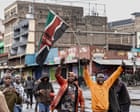
This week, the world witnessed a series of significant developments, ranging from political directives in Kenya to humanitarian aid challenges in Gaza, maritime distress in the Red Sea, and international legal actions against the Taliban. Each of these events illustrates the complex tapestry of global affairs and the relentless pursuit of peace and justice.
In Kenya, President William Ruto intensified his stance against recent anti-government demonstrations. In response to protests that led to the tragic loss of 31 lives, Ruto made a controversial directive, urging police forces to aim at the legs of protesters whom he accused of engaging in acts of terrorism. While emphasizing non-lethal methods, this approach reflects deepening tensions within the country as authorities navigate the complexities of maintaining order while respecting human rights.
Meanwhile, in the besieged Gaza Strip, medical personnel and aid workers face overwhelming pressures as they contend with frequent “mass casualty incidents” arising from clashes at food distribution sites. According to local doctors, many Palestinians have been wounded by gunfire while trying to access much-needed aid distributed by the Gaza Humanitarian Foundation, an organization supported by international efforts. These incidents underline the ongoing humanitarian crisis and the urgent need for a peaceful resolution to support those in dire need.
On the high seas, the plight of the cargo ship Eternity C captured global attention as it became the target of a violent attack by Houthi forces in the Red Sea. Though seven crew members were rescued, four lives were lost, and 14 individuals remain missing. This distressing event highlights the dangers faced by maritime vessels in conflict zones and the critical importance of enhanced security measures to protect seafarers and international shipping routes.
In a promising development, the International Criminal Court (ICC) has issued arrest warrants for Haibatullah Akhundzada, the Taliban’s supreme leader, and Abdul Hakim Haqqani, the chief justice of Afghanistan, implicating them in crimes against humanity for the persecution of women and girls. The ICC’s action was met with approval from human rights activists, who view these warrants as significant steps towards accountability for abuses that have stripped Afghan women and girls of fundamental rights and freedoms. This development underscores the global commitment to justice and human rights for oppressed groups.
In these complex and multi-faceted global challenges, the diligence of international communities in securing peace, delivering humanitarian aid, and pursuing justice remains essential. Whether through diplomatic means, legal proceedings, or direct intervention, these efforts serve as potent reminders of the collective responsibility to foster stability and protect human dignity across all nations.
Source: {link}
